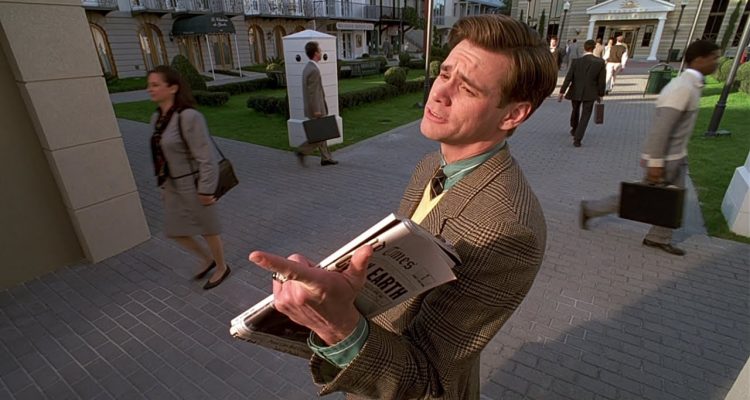Election Day has finally arrived. It’s been quite taxing, but these tumultuous times have afforded us an opportunity to reflect thoughtfully on the current events swirling around us. There’s a good chance this thoughtful reflection will continue long after the polls close later today. These are scary, strenuous, exhausting days, but thankfully we have the art of cinema to help us deal with our restless feelings. People are quick to discuss how Orson Welles’ “Citizen Kane” and Alexander Payne’s “Election” helped forecast our current news-cycle streams, but perhaps Peter Weir’s masterful 1998 Oscar-nominated “The Truman Show” is the one that really explains our current situation best. That’s the thesis behind Nerdwriter1’s video essay “What The Truman Show Teaches Us About Politics,” and it’s one that makes a good deal of sense in a political cycle that refuses to make any sense at all.
Centered around the unsuspecting life of Truman Burbank (Jim Carrey), the star of a life-consuming reality show beyond his knowledge, “The Truman Show” is, in essence, a startlingly ahead-of-its-time commentary on entertainment, society and the all-consuming media, but it’s also a telling examination on how social conformity and one’s desire for escapism in a world of endless confusion could fuel our current political landscape. “We accept the reality of the world in which we’re presented,” showrunner Christof (Ed Harris) notes during a TV interview. It’s the disillusionment of that very notion, the one that’s seemingly behind republican nominee Donald Trump’s rigorous campaign, that explains how on earth the former host of NBC’s “The Apprentice” might potentially end up the leader of the free nation. I use “explain” loosely.
READ MORE: Oscar Mistakes: 20 Classic Films Not Nominated For Best Picture
Weir and screenwriter Andrew Niccol, both of whom were nominated for Oscars for their work alongside Harris, were downright prophetic with this film. As Nerdwriter notes, the ubiquity of reality television and the rise of mass surveillance both keyed into the generation of Cold War paranoia and the fear of being watched and bugged in your everyday life. Yet it also feeds into the future millennial’s endless narcissism and self-appraisal, with younger people bugged when they’re not being watched in all their Instagram glory. The allegories, layered readings and heady arguments afforded by “The Truman Show” are quite endless, and it stands out even to a kid, like the video editor was when he first saw it, and like myself, who proclaimed it to be my favorite movie when I was 11. In fact, my college blog, The Watching World, was named after the very film, in a factoid that should impress nobody.
The film is not pedantic or preachy. It merely asks a lot of questions, but none of them override the story or characters, which makes “The Truman Show” stronger as a result. And it still holds value today, presenting an allegory of the present in that our own world is experiencing a lot of similar “ruptures,” like The Great Recession in 2008; the killing of young black people by the police; the Brexit movement; and, of course, the political rise of outsider movements from Trump to Bernie Sanders. American society, like the titular Truman, is living in an arguably broken moment, but it only works if America/Truman believes in it. After all, he can leave at any time he wants, and a lot of Americans are ready to make a change.
Ultimately, “The Truman Show” shows us what waking up looks like, but it also stages the struggles and the sorrow that come along with it. Even people we trust can be mouthpieces for a rotten system in “The Truman Show,” Nerdwriter states. Utopia is flawed and filled with contradictions and people obsessed with TV. It’s a small, shadowy door that can lead into the unknown and unmapped. But is it one worth exploring? “The Truman Show” has a couple possible explanations….check out the video and let us know what you think in the comments section.

